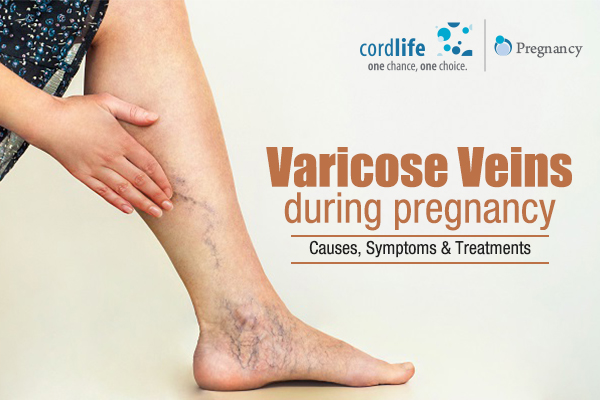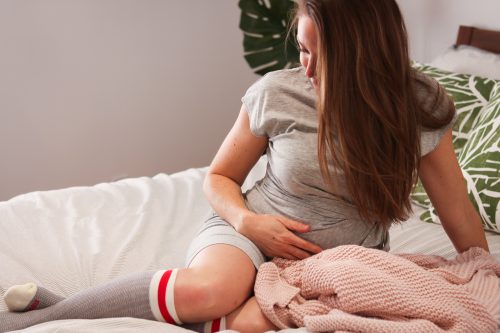Table of Contents
You might have to undergo several changes like morning sickness, fatigue, skin changes, etc. during pregnancy. Varicose veins during pregnancy are just one of them. However, this is not a condition to feel worried about.
What are Varicose Veins In Pregnancy?
Varicose and spider veins are blue, red, or skin–coloured twisted veins. They form a rope-like pattern and are seen on:
- the backside of the thighs
- on the calf muscles
Pregnancy is supposed to be a major contributor to the incidence of varicose veins. These veins bulge out of the skin Pregnancy varicose veins can give rise to symptoms like venous insufficiency and swollen vein in the leg. In fact, hemorrhoids, which appear on rectum are also varicose veins.
During pregnancy, you might be affected both by varicose and spider veins. According to research, around 40% of pregnant women have varicose veins. However, spider veins in pregnancy, are different from varicose veins. The spider veins occur on the legs, ankles and face. They have a tree branch-like appearance and are smaller in size.
What Are The Causes of Varicose Veins In Pregnancy?
Weak or damaged valves can give rise to varicose veins. However, this reason is not all! There are other causes of varicose veins. They are as follows:
Extra Pressure On The Uterus
As you proceed with your pregnancy, your uterus grows with the aim to accommodate the baby. As a result, it puts pressure on the large vein on the right side of your body (the inferior vena cava), which in turn pressurises your leg veins.
Soaring Hormones
During pregnancy, the progesterone levels rise, causing the walls of the blood vessels to relax. In fact, the extra blood that you produce during your pregnancy puts pressure on your veins. If you put additional pressure on your blood vessels, particularly on the veins of your legs, you might have to work against gravity to push the extra blood back up to your heart.
Well! If you’re plus-size during your pregnancy, carrying twins or multiples, have a history of varicose veins, and standing for a long period of time are at the risk of getting varicose veins.
What Is The Treatment For Varicose Veins During Pregnancy?
You can surely consult your physician about the treatment procedure for varicose veins, however, you can also use home remedies as a treatment method. Therefore, the treatment procedures are:
Wear Stockings
Don’t just wear any stockings. Wear compression stockings for varicose veins. By applying firm and constant pressure to the veins in your legs, compression stockings increase blood flow and allow blood to flow back to the heart. As soon as you wake up in the morning put them on, and take them off before you head to bed at night.
Check Your Weight
Undoubtedly, you should gain weight to support your baby’s development inside you. However, check with your doctor to know exactly how much weight you should gain during your pregnancy, which would be good both for you and your baby.
Keep Your Constipation in Check
Constipation increases the risk of varicosities and hemorrhoids. However, by drinking plenty of water, and consuming low salt and food rich with fibre can keep your constipation under check.
Keep Your Feet Elevated
This will improve the blood circulation in your body. You can alternately sit down and keep your legs at rest for at least 3 hours. Keep switching your weight between one leg and the other even while standing.
Do Some Moderate Exercise
Choose pregnancy-friendly exercises advised by your doctor. Practising exercises daily can increase your blood flow and doesn’t allow the blood to clot.
Don’t Strain On The Rectum
Since haemorrhoids is also a part of varicose veins, and constipation is a common pregnancy symptom, try not to strain on the rectum, while you’re sitting on the toilet. Straining might aggravate the problem.
Don’t Forget Your Daily Dose of Vitamins
Having a balanced diet can definitely keep your veins healthy during your pregnancy, however eating some Vitamin C – rich food and fruits can also help. Oranges and melons are some Vitamin C-rich fruits to name a few.
Sleep On Your Left Side
This reduces the pressure on your uterus and maintains the flow of the blood.
Varicose veins may be painful at times, but they can’t make you feel uncomfortable. Neither can they do any harm to your child in your womb. You might get them within three or four months of your pregnancy. However, apart from waiting for the time to deliver your baby, you can’t do anything to get rid of varicose veins.
So, don’t worry! This is an easy pregnancy challenge. Accept it and enjoy your pregnancy journey.
In the meantime, don’t forget to follow our blog page about pregnancy, and cord blood banking.

